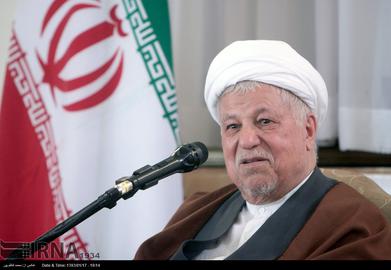Hardliners have accused Akbar Hashemi Rafsanjani of trying to weaken Iran’s military, delivering the latest blow in an ongoing battle between the former president and head of the Expediency Council and Iran’s conservative politicians, clergy, and media.
Rafsanjani’s office issued a statement strongly denying the accusations and expressing anger over what it said was “an indication of an organized conspiracy” against him.
“If today you see that Germany and Japan have the strongest economies in the world it is because that after World War II they were prohibited from [having offensive] military forces,” Rafsanjani said on August 10 during a speech about economic progress. Speaking at an education conference, he said that, having freed up the funds normally spent on costly military forces, these countries were in a position to allocate more money for scientific innovation and projects beneficial to their economies. He said Iran was in a position to head in that direction, adding that he was “confident that Rouhani’s administration can get us there.”
When hardliners lashed out at the comments, Rafsanjani and his office responded by saying that they were only meant to emphasize the need for “scientific military production” and that he had no way questioned Iran’s military. He said his critics had accused him of inviting Iran’s enemies to attack them, an accusation that was simply untrue.
Hossein Shariatmadari, the managing editor of Iran’s most well-known hardliner newspaper, Kayhan, was quick to respond. “The statement by Mr. Hashemi Rafsanjani,” he wrote, “is an invitation to America and other declared enemies of the Islamic Republic of Iran to attack our country.” He also said the comments amounted to “a prescription for returning to a time of oppression, poverty, backwardness...and for making Iran into an obedient slave of America.”
Although Rafsanjani denied he was suggesting Iran’s military be downsized, he has made similar comments before. In March, he tweeted that “the world of tomorrow is the world of discourse, not of missiles.” The comments angered Supreme Leader Ayatollah Khamenei, who told an audience: “If this was said out of ignorance then it is one thing. But if it was said consciously then it is treason.” The leader also added: “Today it is time for both negotiations and missiles.”
Shortly thereafter, the tweet was edited — and soon after that, Rafsanjani’s office said he did not have a Twitter account. The recent statement issued by his office suggests it is trying to stave off another reprimand from Khamenei.
In recent months, and in particular after the implementation of the nuclear agreement began, the supreme leader has gone out of his way to publicly and strongly support Iran’s military and its activities. “Expanding military industries is quite logical,” he said on one occasion. “We must strengthen our defensive might so that bully powers will feel threatened.”
“A Fateful Struggle”
On July 2, Khamenei said that Iran “is engaged in a struggle for its fate” and that it was Iranian officials’ duty to strengthen the military capabilities of the country.
The recent row reveals the deep divisions between Khamenei and Rafsanjani, and between their supporters. Because of his position as Iran’s most powerful man, Khamenei has tended to win these sorts of arguments. But Rafsanjani remains influential, and the media is particularly attuned to what he has to say. Undoubtedly, these comments will now be more widely debated and discussed across the media.
And there are wider discussions too, all of which will benefit from the aftermath of this recent row. Rafsanjani’s critics argue that these comments signal further trouble ahead. “Are the dreams of the enemy to restrict nuclear and missile activities through the nuclear agreement coming true?” an article in the newspaper Resalat asked. The Mashregh News website established a link between Rafsanjani’s statements and a decrease in Iran’s defense budget, claiming that the goal was to weaken the military forces of Iran and the so-called “axis of resistance.” Abdollah Ganji, managing editor for the Revolutionary Guards-affiliated Javan newspaper, complained that the national honor of Iranians had been sold off cheaply and called for a complete overhaul in Iran’s political landscape. Next year’s presidential election was the time to do this, he said, and called for an “electoral revolution”. Once again, the row between Iran’s political elite has demonstrated just how divided Iranian society is — and that even among the country’s most influential decision makers, there is strong disagreement about how the future of Iran should take shape.
visit the accountability section
In this section of Iran Wire, you can contact the officials and launch your campaign for various problems

























comments